Lesson Notes By Weeks and Term - Primary 5
CULTURAL DIVERSITY
SUBJECT: SOCIAL STUDIES
TERM: 1ST TERM
Topic: Cultural diversity
Behavioral objectives: At the end of the lessons, the pupils should be able to
Different kind of Charts and references materials
Scheme of work
And other relevant materials
6 years basic Education curriculum
Online information
Building background connection to prior knowledge: pupils are familiar with the topic in their previous classes
Culture is the total way of life of a group of people. It includes language, mode of dressing, way of greeting, music and dances, religious festivals and farming techniques. Diversity refers to a variety or wide range of culture. Unity, on the other hand, refers to oneness. Unity in cultural diversity, therefore, refers to oneness, in spite of the differences in culture, i.e. customs, traditions and languages.
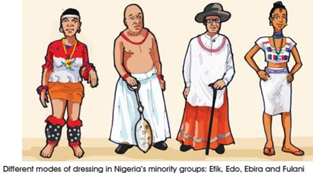
Nigeria is a country of many cultures. Each of the many ethnic groups in Nigeria has a different culture. For instance, in Edo and Delta states alone, there are more than ten ethnic groups with different cultures, although certain things are common to all of them.
The way of life of Nigerians is similar in many ways, but some differences can be seen among the different cultures. These differences include the following:
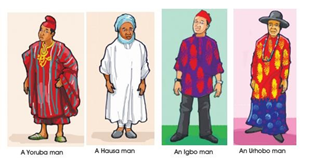
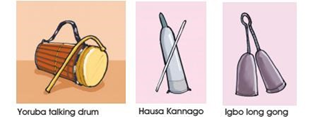
Music and dance go together. For example, Atilogwu dance and Nkwa umu agbogho dance among the Igbo are very important. Drums and music are played on important occasions only, and not just for mere entertainment. These occasions include funeral, marriage and coronation ceremonies

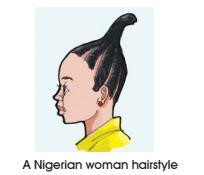
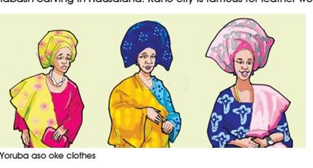
Similarities in customs and traditions
There are things that are similar among the different cultures in Nigeria. For instance:
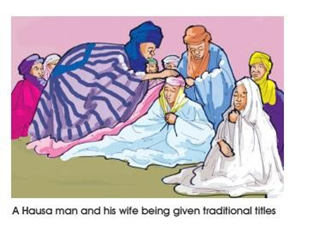
Many things or factors have helped to bring about changes in our society. These include technology, religion, politics, education and the ways in which people make money. Changes take place all the time in almost all aspects of Nigerian life.
However, we should still keep some of our customs and traditions. Those we should keep include the following:
If we keep and preserve these customs, we would become special, and other countries would recognize our people anywhere in the world
Some aspects of our cultures need to be changed. Some are already being changed. These include:
There are many reasons why we need to change certain aspects of our way of life (customs and traditions). Here are some of them:
1 When some of our people get ill, they depend on traditional healers, or medicine men and charms, to make them well again. This was the practice in the past. However, since modern medicine is much better and effective, everybody should adopt it. This will make us have better health. 2 Breastfeeding babies is traditional. It then changed to bottle-feeding or using baby formula because women wanted to work outside the home. Breast milk is the best food for babies. We should give it to our babies, even if it means using it along with baby formula.
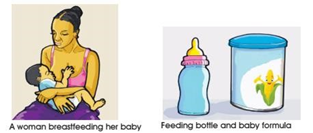

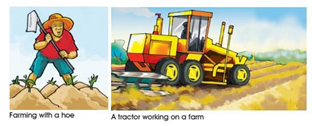
Most of the bad aspects of our cultures can be changed through education. Such education must be given in schools, on television and radio, on the Internet and in newspapers. Government agencies, like the National Orientation Agency, and religious bodies can help to provide this education.
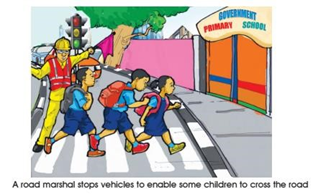
Nigeria is a very large country. There are more than 300 ethnic groups in Nigeria, speaking different languages. Here are some of the ethnic group
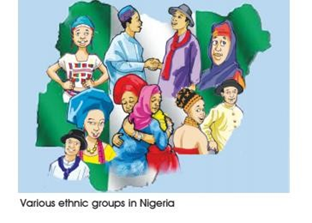
State Ethnic groups
Akwa Ibom: Ibibio, Anang
Anambra: Igbo
Bauchi: Hausa, Tangale, Fulfulde, Korkera, Poli, Yolla, Eleme
Bayelsa: Ijaw
Benue: Igala, Tiv, Idoma, Igede
Bornu: Kanuri, Shuwa, Bedde, Fulfulde, Bura, Ngizim, Hausa, Kanembu
Cross River: Efik, Efut, Qua, Ejagham, Ekoi
Delta: Urhobo, Itsekiri, Kwale, Igbo, Isoko, Ijaw
Edo: Bini, Afemai, Esan, Owan
Imo: Igbo
Kaduna: Hausa, Kaje, Gwari
Lagos: Yoruba
Niger: Gari, Nupe, Koro, Hausa
Ondo: Yoruba
Oyo: Yoruba
Plateau: Birom, Agas, Miango, Hausa
Rivers: Ijaw, Igbo, Ikwerre
Some people who speak other languages live among us in our states. Some of our people also live among people who speak other languages.There are people who speak Hausa and Fulfulde languages, who live in places like Lagos, Ibadan and Onitsha. Also there are people who speak Igbo language, living in places like Kano, Kaduna, Sokoto and Akure. We should, therefore, accept people who do not speak our language, and be friendly with them. If we do not accept other people in our area, our people living in other areas will not be accepted by others. We are all human beings, and we are equal before God. Also, as citizens of the same country, we should learn to work together in unity for the progress of our country.
Teacher asks questions from pupils based on the topic wrap up and conclusions
Teacher goes over the topic for better understanding.
Assignment
1. Define Culture
© Lesson Notes All Rights Reserved 2023